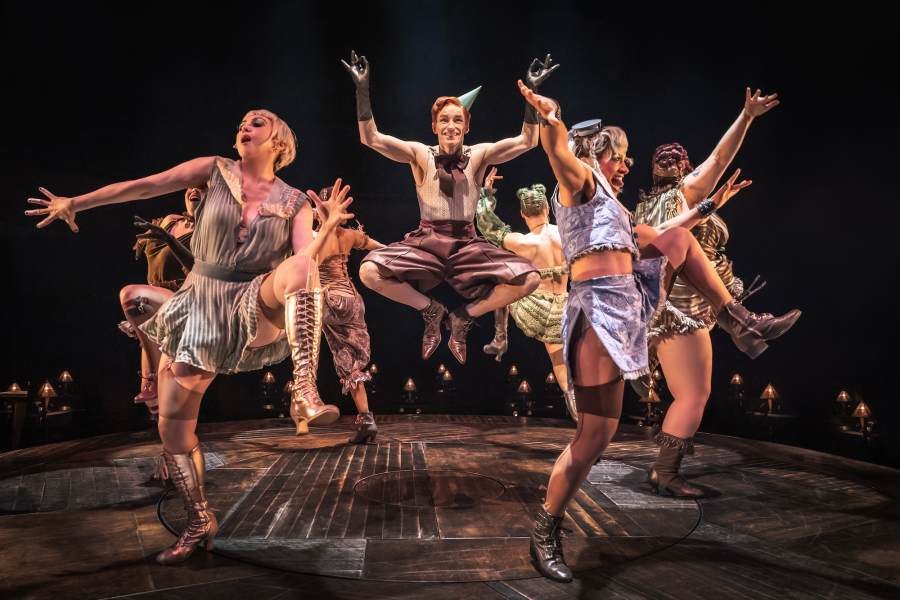

One problem with revivals is that creatives often feel a need to change things up. So they might use a different time, setting, storyline and sometimes even remove music. The recent revival of “Cabaret at the Kit Kat Club” starring Eddie Redmayne as the Emcee now includes a prologue. Attempting to create the mood and atmosphere of seedy decadent Berlin pre World War 2, the show offers a downstairs trip to the ‘vault bar,” including drinks (a vile nasty cough medicine tasting concoction) musicians and dancers. It’s a show before the show to create atmosphere.
To do this meant the August Wilson Theatre had to undergo major revisions. In the center of the theater is a small stage with an even smaller platform that rises upon occasion. “Cabaret at the Kit Kat Club” is presented in the round, which troubled me because I felt like when one performer was singing, we only ‘saw’ half’ the show. When Bebe Neuwirth sang her first song, “So What,” she faced the other half of the theater most of the time. Although the dancers were constantly moving and the audience always saw some of them, it still felt like we were missing something.
The action at the Kit Kat Club occurs during the dissolution of Berlin. Forget your troubles; just enjoy yourself. It’s decadent and dissolute with a lot of suggestive dancing and sexual allusion. Unlike many of the other musicals on Broadway, the costumes aren’t glitzy and spangly but look threadbare, consisting of rags barely pieced together. The dancing with choreography by Julia Cheng feels frenzied. The dancers prowl around the stage near the tables. They suggest an air of desperation, the need to stay entertained but to survive; they aren’t attractive, just hungry-looking.
The story begins with the arrival of would-be novelist Clifford Bradshaw (Ato Blankson Wood.) Bradshaw, serving as a sort of narrator, is distracted by the sordid goings-on at the club but gradually becomes aware of the changing political environment. He meets a young German who takes him out to the Kit Kat Club where he meets Sally Bowles.
Gayle Rankin plays Sally, a performer at the club. Kicked out of her lover’s rooms, she arrives penniless at Bradshaw’s room and insinuates herself in his room and his life. Rankin’s best work is in the small, quiet moments. Her rendition of “Maybe This Time” is heart-rending. When she sings wistfully and hopefully that there may be a future, it's lovely. In contrast is when she performs the title song “Cabaret,” when she is basically shouting every word in pain.
The entertainment at the club is led by the Emcee Eddie Redmayne. The chameleon-like Emcee wears unique costumes (Scenic, and costume design by Tom Scutt. ) The role is an interesting departure for Redmayne. Although almost six feet tall, he crouches over menacingly or submissively. Redmayne works very hard but id never as terrifying as Alan Cummings was in the last version. When he sings “If You Could See Her,” the audience sat quietly at first, barely reacting before applauding. His final costume change into a plain brown suit, suggesting Nazi garb, is perhaps the most frightening of all. He’s the Emcee but really not a character because he leads us but doesn't have any story of his own. Redmayne’s singing is adequate and the role allows him to take risks.
Director Rebecca Frecknall makes good use of most of the John Kander and Fred Ebb music. The music is still wonderful and many will recognize familiar songs, like “ Willkommen,” “The Money Song” and the title song, “Cabaret.”
Personally I enjoyed the quieter numbers. “It Couldn’t Please Me More,” a charming piece beautifully describes the relationship between the spinster Fraulein Schneider (Neuwirth) and one of her boarders, store owner Herr Schultz (Steven Skybell.) He displays his affection with fruit and the two sing the song about a pineapple which becomes very suggestive. Their story is the reality of pre-war Berlin. When she learns that he is Jewish, she breaks off her engagement, fearing the Nazis. Schultz insists it will all be fine since he was born in Germany. The dramatic irony is that we know it won't, yet we can’t warn him. Their scenes are the most touching and most affecting.
While one problem with revivals is change, another problem is comparisons. Inevitably people who saw “Cabaret” before will compare it to the new version. Although Frecknall‘s version is creative with a feminist slant, some will feel that it was done better the last time.
August Wilson Theatre
245 West 52nd Street,
New York, NY 10019